COMPARISONS of LANGUAGES INVOLVED
in the translation of the MAALAN AARUM |
| INTRODUCTION |
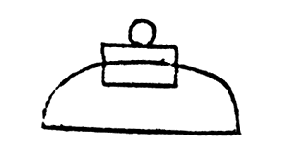
3.1 |
|

3:2 |
They lived where it snowed.
They lived where it stormed.
They lived where it was always winter. |

3:3 |
While still in their cold land
They remembered longingly
the mild weather,
the many deer,
and also foxes |
| HUNTERS GO EVERYWHERE |
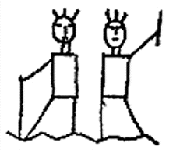
3:4 |
The poor, lonely, but tough men
became hunters and
left those living
in strong houses.
|

3:5 |
Separated from home
like breasts on the same body
the hunters became tougher
extremely good and
they reached for the sky. |

3:6 |
The hunters camped
in the north, east,
south and west. |
| CHRIST TRUMPS ODIN |
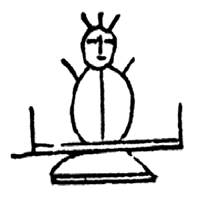
3.7 |
The man, who ruled
in that old, northern land
that they all left,
was baptized to be pure. |
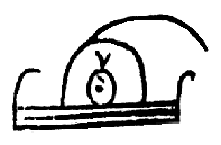
3.8 |
The discouraged people
were worried about
worn out land
they had to abandon.
The priest said,
"We decent people
should go somewhere else."
|
| Maalan Aarum |
Algonquin |
Old Norse |
wemiako
yagawan
tendki
lakkawelenam
nakopowa
wemiowenluen
atam |
wemi akoores
yakawa mew
tiindey aki
naka lawélendam
enkooda powwow
wemi owena rena
at a pin |
hveim uugarrus
raekja medn
tandri akr
knekkja lav lyndi
hneigjanda paave
hveim hvii-einn hrein
endr aa bua |
 |
|
 |
all the cabin fires of that land
were disquieted
(cabin fires?)
(missing?)
and all said
to their priest
“let us go” |

original English
translation

translation
of Old Norse |
all gentle (common people)
have regard for (about)
(their) fire(d) ground (land)
(they) abandon (it with) low disposition.
Agreeing (the) priest (said)
all which (who are) decent
remain in a different (place) |
| |

paraphrase |
The discouraged people
were worried about
worn out land
they had to abandon.
The priest agreed,
"We decent people
should go somewhere else." |
WORD (PHRASE) BY WORD (PHRASE) DECIPHERMENT
(All references are to Sherwin’s eight volumes of the Viking and the Red Man) |
| Original English |
all the cabin fires of that land |
|
| Recorded sounds |
wemi ako |
1* |
| Algonquin words |
wemi akoores |
v. 4 p. 156 & v. 1 p. 8 |
| Old Norse |
hveim uugarrus |
|
| Norse/English |
all gentle (common people) |
2* |
| |
|
|
| Original English |
were disquieted |
|
| Recorded sounds |
yagawa n |
|
| Algonquin words |
yakawa mew |
v. 3 p. 151 |
| Old Norse |
raekja medn |
|
| Norse/English |
have regard for (about) |
|
| |
|
|
| Original English |
(cabin fires?) |
1* |
| Recorded sounds |
tend ki |
|
| Algonquin words |
tiindey aki |
v. 8 p. 109 |
| Old Norse |
tandri akr |
|
| Norse/English |
(their) fire(d) ground (land) |
3* |
| |
|
|
| Original English |
(missing?) |
|
| Recorded sounds |
lakk awe len am |
4* |
| Algonquin words |
naka lawé lendam |
v. 4 p. 90 & v. 8 p. 45 |
| Old Norse |
knekkja lav lyndi |
5* |
| Norse/English |
(they) abandon (it with) low disposition |
|
| |
|
|
| Original English |
and all said to their priest |
|
| Recorded sounds |
nako powa |
|
| Algonquin words |
enkooda powwow |
v. 7 p. 52, v. 8 p. 86 |
| Old Norse |
hneigjanda paave |
|
| Norse/English |
agreeing (the) priest (said) |
6* |
| |
|
|
| Original English |
“let us |
|
| Recorded sounds |
wemi owen luen |
|
| Algonquin words |
wemi owena rena |
v. 4 p. 156 & 1O6; v. 1 P.168 |
| Old Norse |
hveim hvii-einn hrein |
|
| Norse/English |
all which (who are) decent |
6* |
| |
|
|
| Original English |
go” |
|
| Recorded sounds |
At a m |
|
| Algonquin words |
at a pin |
v. 4 p. 17 |
| Old Norse |
endr aa bua |
7* |
| Norse/English |
remain in a different (place) |
6* |
| back to top |
Notes |
1*Somehow somebody changed the sense of the original spoken words. The Algonquin/ON words mean “all the gentle (people).”
Both the Recorder and the Editor may have recognized the common Algonquin word for fire, “tend,” and may have misunderstood “ako.” “Tend,” comes later in the verse but may have caused them to think of “cabin fires.” Also they may have thought that “ako” was “aki” meaning, “land.” (See third set of recorded sounds below.) |
| 2* The Old Norse literal meaning for “uugarrus” is “not coarse.” Sherwin suggests an idiom meaning, “gentle,” but the Algonquin use of the word appears to mean “common people.” |
3*The original sounds are best deciphered as words meaning “fire(d) area (lands),” The “fire(d) land” words may have been the source of the “cabin fires” that the Recorder or the Editor wrote in the first phrase of this verse.
Charles Mann, in his book 1491, cites several sources who reported that the Indians (Algonquin/Old Norse) burned the grasslands of the Great Plains to improve the grass. Hardy broad leaf plants will usually intrude into an over grazed pasture. The broad leaves shade the grass and are poor fodder, (When I was a farm boy. before herbicides, I often mowed our pasture at the best time to kill the broad leaf plants.) The Norse in Greenland may have fired their overgrazed grass lands in an attempt to kill the broad leaf plants.
The difference between burning grass land in the Great Plains and in Greenland is spring moisture. The rainfall on the Great Plains peaks in April, May, and June. In Greenland the months of April, May, and June have the least moisture.
The logical time to burn to kill broad leaf plants is in the fall when the pasture plants have dried. But then the winter snow, the most likely source of Greenland moisture, might have been blown past by the winds and was not caught by grass which was not there. The low rainfall in the spring may have slowed the growth of the grass. So the Greenlanders attempt to control the broad leaf plants by burning may have created an ecological disaster resulting in the near death of the grass lands. |
4*“n” morphing to “l” is common in Algonquin dialects. |
5*Sherwin’s definition of “knekkja” included “abandonment” or “leave.” These words seem to mean that the common people had to abandon their burnt out land, which they did with discouragement.
Some modern historians have made hypotheses that the Norse animal culture would have destroyed the Greenland grass lands. These words appear to support their hypotheses.
Centuries later in luscious America, the Historian, the Recorder, and the Editor may not have perceived an ecological disaster as the cause for people to leave the land. |
6* The sense of these words appear to be that the priest heard the people’s troubles and agreed with them to go to a different place. |
7* The morphing process slipped in an “n” to “a” but also an “a” to “n” then “n” to “m” along with “b” to “p.” The dropped “p” may have happened at the recording session. |
| back to top |
|
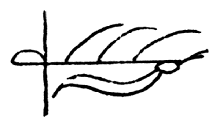
3.9 |
The common people
in the east stole away
the brothers
abandoned all
with great discouragement
and again discouragement |

3.10 |
In a short while
the weeping, weak, dirty.
needy (people from)
the burnt land
saved themselves and
rested on the other side |

3.11 |
After moving down
from the snowy land
and discreetly leaving
the cousins separated
through out all the land |
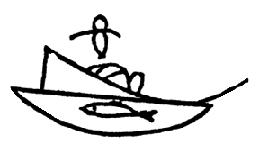
3.12 |
Where there was little
pack ice in heaped ice
with a lot of snow drifts,
the white geese ruled
and the white bear ruled |
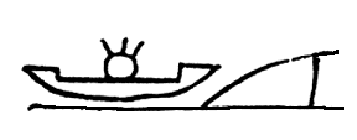
3.13 |
Floating up the streams
in their canoes,
our fathers were rich.
They were in the light
when they were at these Islands. |
| THE DECISION |

3.14 |
"Head Beaver and Big Bird
said 'Let us go to Akomen'" |
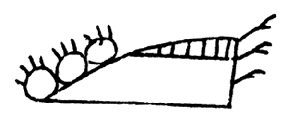
3.15 |
All say they will go along,
All who are free to go. |
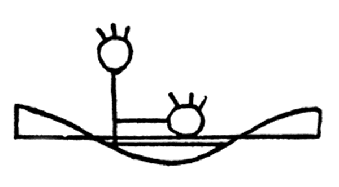
3.16
|
Those of the north agreed.
Those of the east agreed.
Over the waters
Over the frozen sea
They went to enjoy it |
| THE MIGRATION |

3.17 |
On the wonderful slippery water,
On the stone hard water, all went
On the great tidal sea,
Over the [puckered pack ice] |
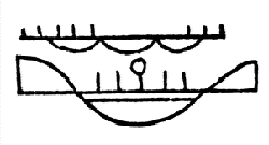
3.18
|
[I tell you it was a big mob]
In the darkness,
all in one darkness
To Akomen, to the [west],
In the darkness
They walk and walk,
all of them |
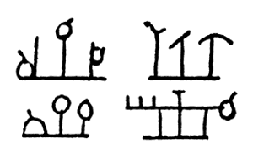
3.19 |
The men from the north,
the east, the south,
The eagle clan, the beaver clan
the wolf clan,
The best men, the rich men,
the head men
Those with wives,
Those with daughters,
Those with dogs |

3.20 |
They all come.
They tarry at the land
Of the spruce pines,
Those from the east
Some with hesitation.
Esteeming highly their
Old home at the mound land |



















